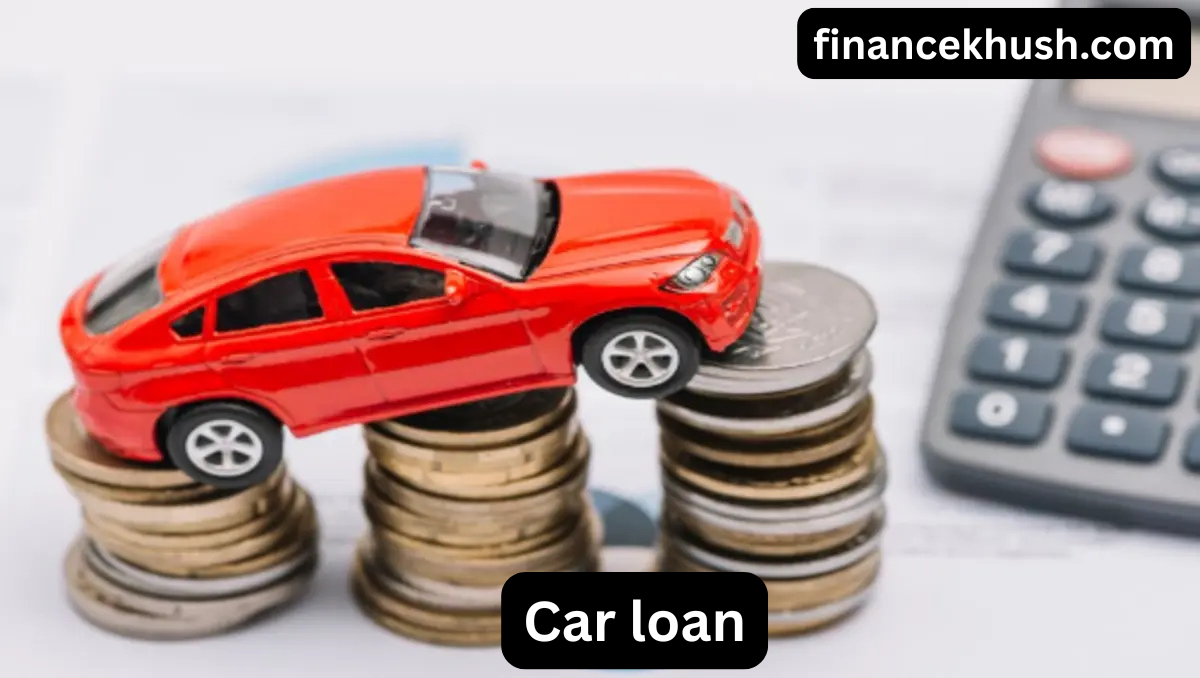Car Loan: A car loan is a financial solution that helps you buy a car when you don’t have the full amount upfront. It allows you to borrow money from a lender, which you pay back in monthly installments over time. Car loans typically come with fixed interest rates and loan terms ranging from 24 to 72 months. With a car loan, you can afford to own a car without having to wait until you have enough savings. The loan amount, interest rate, and monthly payments depend on factors like your credit score, the car’s price, and your down payment. It’s an accessible way to make your car purchase more affordable and spread the cost over time.
What Is a Car Loan?
A car loan is a type of personal loan that you take out to buy a car. When you apply for a car loan, a lender (usually a bank, credit union, or car dealership) gives you the money to purchase the vehicle. In return, you agree to pay back the loan over a set period, usually between 24 and 72 months, plus interest.
The amount of money you borrow is typically based on the car’s value and the down payment you can afford. Each month, you will make a fixed payment until the loan is fully paid off. If you don’t make your payments on time, the lender has the right to repossess your car.
How Do Car Loans Work?
When you get a car loan, you’re essentially entering into a contract with the lender. Here’s how it works:
- Application: You apply for the loan either online, at a bank, or through a car dealership. The lender will assess your financial situation to decide if they’re willing to approve the loan and what terms they will offer.
- Loan Approval and Terms: If you’re approved, the lender will provide you with the loan amount (or the financing needed to purchase the car). The terms of the loan will include:
- Loan Amount: This is the amount of money you’re borrowing to purchase the car.
- Interest Rate: This is the rate the lender charges you for borrowing the money. It’s usually a percentage of the loan amount.
- Loan Term: This is how long you will have to repay the loan (typically between 24 to 72 months).
- Repayment: You agree to pay the loan back in monthly installments. Each payment will consist of the principal (the amount you borrowed) and interest (the cost of borrowing).
- Ownership: While you’re paying off the loan, the lender technically owns the car. Once you’ve paid off the entire loan, you will fully own the car.
Types of Car Loans
There are a few different types of car loans available, each suited for different needs. Understanding these options will help you choose the best loan for your situation:
- Secured Car Loan:
A secured car loan is the most common type of loan. With this loan, the car itself is used as collateral. This means that if you fail to make your payments, the lender has the right to repossess the car. Since this loan is backed by the vehicle, interest rates are typically lower than unsecured loans. - Unsecured Car Loan:
An unsecured car loan doesn’t require any collateral. While this can be beneficial if you don’t want to risk losing your car, it also means the lender may charge you a higher interest rate because they are taking on more risk. - Dealer Financing:
Some car dealerships offer financing directly to buyers. While this can be convenient, it’s important to compare the loan terms with other options. In some cases, dealer financing can have higher interest rates or hidden fees, so be sure to read the fine print. - Personal Loan:
You can also use a personal loan from a bank or credit union to buy a car. While this may not be the most common route, it can be an option if you prefer not to use your car as collateral or if you have a good credit history.

Factors to Consider Before Getting a Car Loan
Before you sign on the dotted line for a car loan, there are several factors to consider to ensure you’re making the right choice:
1. Your Credit Score
Your credit score plays a significant role in determining whether you’ll qualify for a car loan and what interest rate you’ll receive. The higher your credit score, the better the loan terms you’ll be offered. If you have a low credit score, you may be charged higher interest rates, or you may not qualify for a loan at all.
2. Loan Term and Interest Rate
While longer loan terms may seem tempting because they offer lower monthly payments, they can actually cost you more in the long run due to higher interest payments. Try to choose a loan term that balances affordable monthly payments with lower interest.
3. Down Payment
The more money you can put down upfront, the better. A larger down payment will reduce the amount you need to borrow, which means you’ll pay less interest over time. Aim for at least 20% of the car’s purchase price as a down payment.
4. Total Loan Amount
Be careful not to borrow more than you need. Some buyers might be tempted to take out a loan for more than the cost of the car to cover extras like extended warranties or accessories, but this can lead to financial strain in the future. Stick to the loan amount that covers only the car’s price.
5. Monthly Payments
Make sure the monthly payments fit comfortably within your budget. You don’t want to be stretched too thin financially just to own a car. As a general rule, your car payment should not exceed 15% of your monthly take-home pay.
How to Apply for a Car Loan
Applying for a car loan is a simple process, but it’s important to prepare ahead of time to improve your chances of approval. Here’s a step-by-step guide:
- Check Your Credit Score: Before applying for a loan, check your credit score. If it’s lower than expected, take steps to improve it before applying. A higher credit score can lead to better loan terms.
- Determine Your Budget: Figure out how much you can afford to borrow. Factor in the down payment and the loan’s interest rate to calculate your monthly payment.
- Shop Around: Don’t settle for the first loan offer you get. Compare rates from different lenders, including banks, credit unions, and dealerships. Look for the best interest rate, terms, and fees.
- Prepare Documents: Lenders will require certain documents when you apply for a loan, including proof of income, proof of residence, and identification. Make sure you have these ready.
- Submit the Application: Once you’ve gathered all the necessary documents, submit your loan application. If you’re applying through a bank or credit union, this may be done online or in person.
- Wait for Approval: After applying, the lender will review your application and financial situation to decide if you qualify for the loan. If you’re approved, they will send you an offer outlining the terms of the loan.
Advantages and Disadvantages of Car Loans
Like any financial product, car loans come with both advantages and disadvantages. Here’s a quick rundown:
Advantages:
- Car Loans Make Vehicles Affordable: Instead of saving up for years to buy a car, you can get one now and pay for it over time.
- Flexible Terms: Car loans come with flexible terms, so you can choose the length of your loan and monthly payments.
- Building Credit: Successfully repaying a car loan can help improve your credit score.
- Ownership: Once the loan is paid off, the car is yours to keep.
Disadvantages:
- Interest Payments: Over the life of the loan, you’ll pay more than the car’s purchase price due to interest.
- Risk of Repossession: If you miss payments, the lender can repossess the car, leaving you without a vehicle and damaging your credit.
- Long-Term Commitment: A car loan is a long-term financial commitment. Make sure you’re ready to handle the monthly payments.

Conclusion
A car loan can be an excellent way to finance a vehicle and get you on the road faster. By understanding how car loans work, considering the different types, and carefully assessing your financial situation, you can make a more informed decision. Remember to compare loan options, look for the best interest rates, and ensure that you’re comfortable with your monthly payments before signing any agreements.
Related post
Whether you’re buying your first car or upgrading to something new, a car loan can help you make that dream car a reality. Just be sure to approach the process thoughtfully, and you’ll be driving off into your new car in no time!
Faq’s
1. What is a car loan?
A car loan is a type of loan that helps you buy a car. You borrow money from a lender and repay it in monthly installments, typically over 24 to 72 months. The car itself is used as collateral, meaning if you don’t make payments, the lender can take back the car.
2. How do I qualify for a car loan?
To qualify for a car loan, lenders usually look at your credit score, income, and debt-to-income ratio. A higher credit score and steady income can help you get better loan terms, like lower interest rates. Be sure to check your credit score before applying to increase your chances of approval.
3. How much of a down payment is required for a car loan?
A down payment of at least 20% of the car’s value is ideal. The larger your down payment, the less money you’ll need to borrow, which can lower your monthly payments and reduce the interest you pay over time.
4. What is the interest rate on a car loan?
The interest rate on a car loan can vary depending on factors like your credit score, the loan term, and the lender. Generally, people with higher credit scores get lower interest rates, while those with lower scores may pay higher rates. It’s important to shop around to find the best rate for you.
5. Can I pay off my car loan early?
Yes, you can pay off your car loan early, but some lenders may charge a prepayment penalty. Check the terms of your loan agreement to see if there are any fees for paying off the loan ahead of schedule. Paying early can save you money on interest in the long run.
6. What happens if I miss a payment on my car loan?
Missing a payment on your car loan can result in late fees and a negative impact on your credit score. If you miss several payments, the lender may repossess your car. It’s important to stay on top of your payments and contact your lender if you’re having trouble making them.

6 thoughts on “Car Loan 101: Simple and Fast”